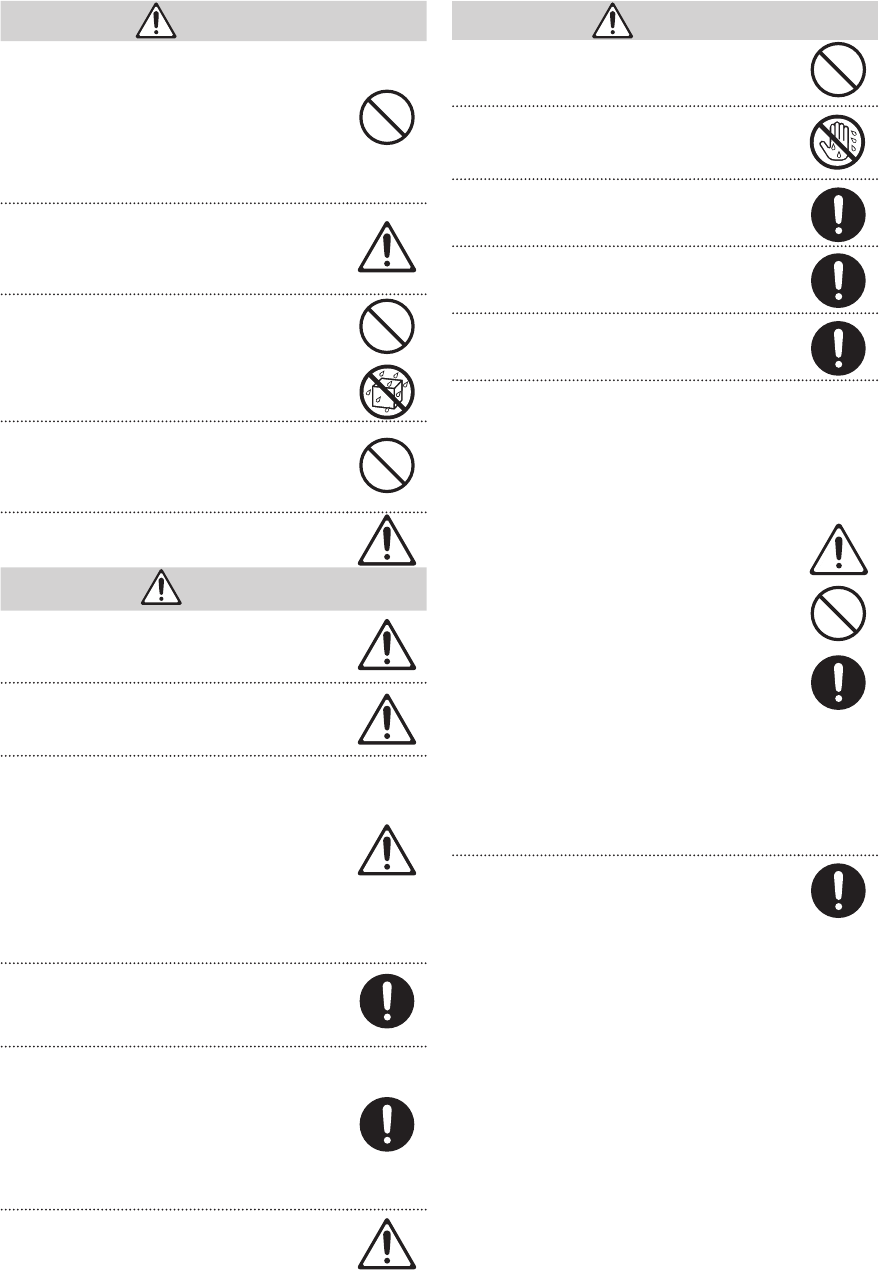
5
WARNING
015
• Do not force the unit’s power-supply cord to share an
outlet with an unreasonable number of other devices.
Be especially careful when using extension cords—the
total power used by all devices you have connected
to the extension cord’s outlet must never exceed the
power rating (watts/amperes) for the extension cord.
Excessive loads can cause the insulation on the cord to
heat up and eventually melt through.
016
• Before using the unit in a foreign country, consult
with your retailer, the nearest Roland Service Center,
or an authorized Roland distributor, as listed on the
“Information” page.
019
• Batteries must never be recharged, heated, taken
apart, or thrown into re or water.
023
• DO NOT play a CD-ROM disc on a conventional audio
CD player. The resulting sound may be of a level that
could cause permanent hearing loss. Damage to
speakers or other system components may result.
027
• Never expose a nickel metal hydride batteries to
excessive heat such as sunshine, re or the like.
CAUTION
101b
• The unit and the AC adaptor should be located so
their location or position does not interfere with their
proper ventilation.
101c
• This (GAIA SH-01) for use only with Roland stand
KS-18Z. Use with other stands is capable of resulting in
instability causing possible injury.
101f
• Please be sure to read and adhere to the cautionary
notices contained in the instructions that came with
this product.
Please note that, depending on the manner in which
keyboard performances are carried out, you may
encounter situations where the keyboard falls o the
stand or the stand topples over, even though you have
followed all of the instructions and advice contained
within the product’s manual. For this reason, you
should always perform a safety check each time you
use the stand.
102c
• Always grasp only the plug on the AC adaptor cord
when plugging into, or unplugging from, an outlet or
this unit.
103b
• At regular intervals, you should unplug the AC
adaptor and clean it by using a dry cloth to wipe all
dust and other accumulations away from its prongs.
Also, disconnect the power plug from the power
outlet whenever the unit is to remain unused for an
extended period of time. Any accumulation of dust
between the power plug and the power outlet can
result in poor insulation and lead to re.
104
• Try to prevent cords and cables from becoming
entangled. Also, all cords and cables should be placed
so they are out of the reach of children.
CAUTION
106
• Never climb on top of, nor place heavy objects on the
unit.
107c
• Never handle the AC adaptor or its plugs with wet
hands when plugging into, or unplugging from, an
outlet or this unit.
108b
• Before moving the unit, disconnect the AC adaptor
and all cords coming from external devices.
109b
• Before cleaning the unit, turn o the power and
unplug the AC adaptor from the outlet (p. 13).
110b
• Whenever you suspect the possibility of lightning in
your area, disconnect the AC adaptor from the outlet.
111: Selection
• If used improperly, batteries may explode or leak and
cause damage or injury. In the interest of safety, please
read and observe the following precautions (p. 13).
1
• Carefully follow the installation instructions for
batteries, and make sure you observe the correct
polarity.
2
• Avoid using new batteries together with used
ones. In addition, avoid mixing dierent types of
batteries.
3
• Remove the batteries whenever the unit is to
remain unused for an extended period of time.
5
• If a battery has leaked, use a soft piece of cloth or
paper towel to wipe all remnants of the discharge
from the battery compartment. Then install new
batteries. To avoid inammation of the skin, make
sure that none of the battery discharge gets onto
your hands or skin. Exercise the utmost caution
so that none of the discharge gets near your eyes.
Immediately rinse the aected area with running
water if any of the discharge has entered the eyes.
6
• Never keep batteries together with metallic objects
such as ballpoint pens, necklaces, hairpins, etc.
112
• Used batteries must be disposed of in compliance with
whatever regulations for their safe disposal that may
be observed in the region in which you live.


















